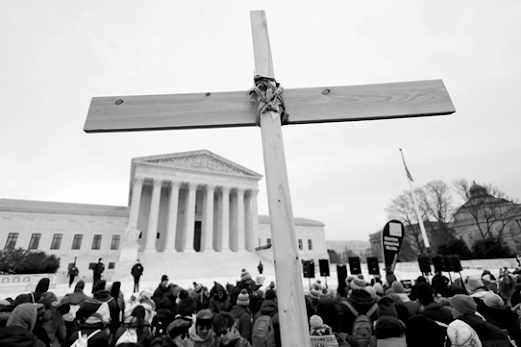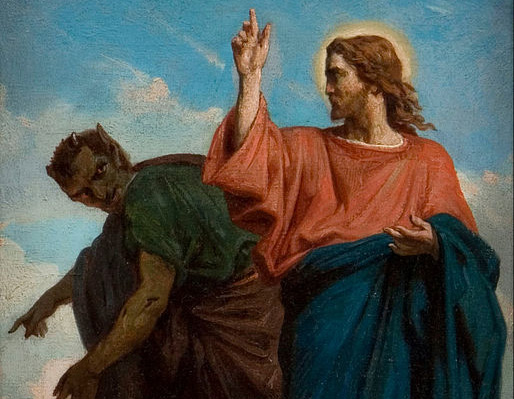It is the first Sunday of Advent. As I am sure many of you know, today is the first day of the annual liturgical calendar. Advent is thus the first season of the church calendar, and it begins four Sundays before Christmas Day.
The church calendar is out of sync with our ordinary calendar not only because its New Year begins, usually, in November, but because the church’s seasons begin on the days they celebrate, not end then. We Americans just celebrated Thanksgiving but now, as far as we’re concerned, Thanksgiving is over and done with, now we are putting up Christmas decorations and already celebrating that day. And on December 26 Christmas will be over and we will focus on the secular New Year’s Eve and Day.
But the church calendar does not work like that. Advent is not about Christmas per se. That's what the season of Christmas is for that begins Christmas day. Advent does lead us to the birth of Jesus in his Nativity in Bethlehem, but Advent's message is not mainly about Jesus' birth – what happened – but his incarnation – why his birth happened and what it portends. In Advent we reflect upon God decisively breaking into human affairs, including in Bethlehem two millennia ago and a time yet to come when Christ will return in judgment.
When will that day come? In Matthew 24 Jesus is speaking with his disciples about the day of the Lord when the Son of Man will come in judgment. Here is what he says:
36 “But about that day and hour no one knows, neither the angels of heaven, nor the Son, but only the Father. 37 For as the days of Noah were, so will be the coming of the Son of Man. 38 For as in those days before the flood they were eating and drinking, marrying and giving in marriage, until the day Noah entered the ark, 39 and they knew nothing until the flood came and swept them all away, so too will be the coming of the Son of Man. 40 Then two will be in the field; one will be taken and one will be left. 41 Two women will be grinding meal together; one will be taken, and one will be left. 42 Keep awake therefore, for you do not know on what day your Lord is coming. 43 But understand this: if the owner of the house had known in what part of the night the thief was coming, he would have stayed awake and would not have let his house be broken into. 44 Therefore you also must be ready, for the Son of Man is coming at an unexpected hour.” (Matthew 24.36-44)
Jesus tells us that his coming as the judge of the world will be in a time of business as usual. In the days of Noah people continued with life as life always had been, eating and drinking and getting married, even though they could see Noah building a big ship about half the size of the Titanic. When the flood came, they got swept away by surprise.
That’s how it will be when the Son of Man comes in judgment, Jesus says. Folks will be caught by surprise in the middle of ordinary life. So, says, Jesus, keep awake. If you knew that a burglar was going to break into your house tonight, you would stay awake. You’d probably have the police parked outside, too. How much more alert we should be all the time in anticipation of the coming of Christ!
Matthew’s passage is not intended to impel us to try to figure out when Jesus is coming, in fact just the opposite. According to Matthew, we cannot know when Jesus is coming. Jesus will come at an unexpected time. So, followers of Christ are to spend their time announcing the Good News and being the body of Christ in this world, not wrapped up in apocalyptic speculation. Christ will know his own when he returns.
We believe judgment is to be feared, do we not? We know what a judge is: someone in black robes sitting high in a courtroom meting out justice and throwing people in jail. Judgment is usually an image of fear for us, and many people think of the coming day of the Lord with images of wars and rumors of war, earthquakes and natural disasters preceding the Last Judgment.
Before we suppose that global catastrophes must precede the return of Christ in judgment, we might want to reflect on the word that Isaiah saw concerning Judah and Jerusalem:
3Many peoples shall come and say, “Come, let us go up to the mountain of the LORD, to the house of the God of Jacob; that he may teach us his ways and that we may walk in his paths.” For out of Zion shall go forth instruction, and the word of the LORD from Jerusalem. 4 He shall judge between the nations, and shall impose terms on many peoples; they shall beat their swords into plowshares, and their spears into pruning hooks; nation shall not lift up sword against nation, neither shall they learn war anymore. 5 O house of Jacob, come, let us walk in the light of the LORD! (Isaiah 2:3-5)
Make no mistake, this God Isaiah is talking about is a God of judgment. Isaiah is speaking of the Kingdom of God as the highest mountain. God will judge among all the nations.
This judgment Isaiah describes liberates all humankind from strife and war and brings peace. This is a judgment of hope! God’s salvation righteousness puts an end to oppression and injustice and violence. God’s judgment rings down the curtain on the way human beings are divided against each other. Men and women, young and old, rich and poor, black and white – all shall come and say, “Let us go up to the mountain of the Lord, that we may walk in his paths.”
Especially heartening is that the nations disarm themselves. We finally will stop killing each other over resources or politics or ideology – or religion.
If Isaiah's vision has such words of hope, it also has an undertone of discouragement. Do we have to wait until God decides personally to take over this world's management to achieve peace? Are we condemned until then to face one war after another, one Nine-Eleven after another, one Coventry after another, one Hiroshima after another? If by Isaiah's lights history is supposed to be moving toward the divine kingdom, why do we see so little evidence of it? The prior century and this one, too, have been drenched in the blood of more uncountable millions than any century ever; just in what way exactly is history progressing toward a divine fulfillment?
So, we can sympathize with those who long for Christ to return on the clouds of heaven and simply take over the world. If Christ shall come again to establish the reign of God forever, a mere glance at news reports makes us think that tomorrow morning would be fine!
After all, God’s justice is saving righteousness. God’s judgment is liberation. Isaiah sees history flowing to the high mountain of God, where all are taught the ways of God and all walk in God’s path.
So why delay, Lord? O Come, O Come, Emmanuel – and this afternoon would be great! But that is not what Isaiah is getting at. He says that the certain coming of the day of the Lord means that we should walk in the light of the Lord now. The judgment of God determines how we should live now. God’s judgment is not only a future event. We are already judged, and thus we should live in faith together, worship in love together, study the Word of God together, be in ministry to each other and the world together.
We have been adjudged, and we have been sentenced – not to punishment, but to love. We are adjudged as ones beloved of God, and we are sentenced to love the Lord our God with all our heart, with all our soul, with all our strength and with all our mind, and to love our neighbors as ourselves.
By now many of you may be wondering what these passages have to do with Christmas. It’s Advent, after all, which is supposed to be about the infant Jesus and the manger. But here’s the preacher talking about the second coming and the end of the world.
The Scriptures designated for the first Sunday of Advent always look forward to the return of Christ. The Advent season ends with celebrating Christ’s incarnation but is always begun with passages to remind us that the reign of God over human affairs is ultimate and for all time. Advent thus does not celebrate only Christmas, Christ’s first coming among us. It also looks ahead to the completion of God’s redemptive acts in the coming again of Christ in judgment. Advent’s theme really is not, “Get ready for Christmas.” It instead asks, “Are we ready for Christ?” Yet the coming of Jesus in the manger and Christ’s coming again in judgment are not so very different. Business as usual describes not only the world when Christ will come again, but also the world when Jesus was born. After all, Joseph and Mary went to Bethlehem in the first place because their taxes had been raised. There sure isn’t anything unusual about that!
The birth of Jesus in Bethlehem was an act of God’s judgment on the world. No savior would have been born if the world did not need saving. When we celebrate Christmas, we celebrate the judgment of God on each of us. To visit the manger is both to be indicted and invited - indicted under God’s judgment and invited by God to be reconciled through his Son.
Like Joseph and Mary two thousand years ago, we live in a time of business as usual. But we cannot just do business as usual. We are to live in the light of the Lord, staying spiritually awake. Just as the people of Judea did not know when their savior would be born, we do not know when Christ will come again in glory.
The comings of Jesus Christ into the world, past, present, and future, should give us a new vision for reality, a new way of seeing what God intends for humanity. This Advent season is a time to be awake and watch for the owner of this house we live in called planet earth. Let Christ take us in judgment, for Christ’s judgment is liberation and freedom. Whether judged by the first Advent or the promise of Christ to come again, we live in the light of Christ. Our Lord breaks into our ordinary lives with extraordinary power when we don’t expect it. Advent is above all else the unexpected season.
Come, Lord Jesus, come! O come, O come, Emmanuel!





